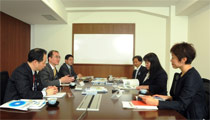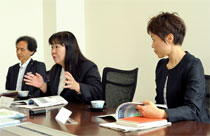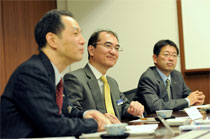Financial Education (Dialogue FY2011)
Stakeholder Dialogue 2011 Financial Education
Mizuho has advocated support for financial education to the elementary, secondary, and higher education levels as CSR Priority activities, beginning full–fledged efforts in this area in fiscal 2006. This dialogue involved employees responsible for such financial education, and looked at several issues, including how our financial education initiatives, now in their sixth year, are being assessed by experts in the field, and what will be needed to further expand these efforts in the field of education.

Stakeholder Dialogue
Participating Experts
 Yukie Ikushige
Yukie Ikushige
Executive Director, School Advice Network (NPO)
 Katsumi Osawa
Katsumi Osawa
Professor
Tokyo Gakugei University
 Takeshi Rikimaru
Takeshi Rikimaru
Teacher
Ushioda Junior High School, Yokohama
 Saeko Jingu
Saeko Jingu
Teacher
Itabashi Special Education School, Tokyo
Participants from Mizuho
 Shuichiro Kayama
Shuichiro Kayama
General Manager of Corporate Communications
Mizuho Financial Group (Currently General Manager of Corporate Banking Division No. 5 Mizuho Corporate Bank, Ltd.)
 Tomoaki Sako
Tomoaki Sako
Head of CSR Promotion Office, Corporate Communications
Mizuho Financial Group
Opening the dialogue, Tomoaki Sako, head of the CSR Promotion Office, Corporate Communications at Mizuho Financial Group, introduced the assembled experts to Mizuho's financial education initiatives to date.
He explained that, in elementary and secondary education, Mizuho has conducted joint research with Tokyo Gakugei University since fiscal 2006, with the initial three years set aside as a basic research period. From fiscal 2009, the focus has been on practical application in the classroom, including development of teaching materials and use of those materials in classroom visits, as well as open lectures for educators to introduce more teachers to the results of the project.
He also reported that, in fiscal 2011 (the sixth year of the project) under the concept of "anytime, anywhere, anyone," the project team prepared a new, even more practical text entitled the New Guide to Life and Money, designed for use at any grade level and within any classroom subject. A teaching guide and DVD version are being prepared for completion in July.
In higher education, he explained about donated lectures and courses in six faculties and five universities.
Supporting use in the classroom through development of the teaching materials for "anytime, anywhere, anyone."
| Osawa | Mr. Sako explained about the development of new texts, and as one of the people involved in that project, I would like to add a little to his explanation. First, the initial thought behind the creation of these teaching materials was not simply the selling off the knowledge bit by bit, but the cultivating of knowledge. The underlying hope was that we could rethink the materials from the point of view of the student, and by using these teaching materials in the classroom, motivate the children to actually practice and experience things on their own. In actually conducting classes, we deal with a wide variety of students. In a sense, these textbooks place an importance on removing barriers such as the type of school or grade level at which they can be used, enabling teachers to utilize those portions of the materials they feel best suit the students in their particular classrooms, without specifying which are for middle school use, which for high school, etc. Similarly, the DVD version has been prepared not as a supplement to the text, but to enable educators to select the version they find easiest to use. We have also made allowances for varying student ability, enabling students with learning disabilities, or so–called newcomers from overseas who may not have adequate Japanese reading and writing skills, to use the DVD to reinforce their study of a particular area. Of course, some teachers and families may feel more comfortable working with printed materials, and by bundling the text with the DVD, we've tried to create a text that can be studied "anytime, anywhere, by anyone." |
| Ikushige | I am with an NPO called School Advice Network, which develops and promotes classroom use of programs based on the knowledge and experience of experts in a wide range of disciplines outside of education. As part of that work, we once held something like a trade fair for Tokyo's Board of Education, addressing the issue of what kind of support corporations would like to offer schools. Mizuho participated in the project from the start, so financial education is a subject with which I am very familiar. Still, from the beginning I've felt that money is a very difficult subject to introduce into classroom teaching, because the entire focus tends to be put on money itself. But now, after the three–year, basic research period, and with the joint research between Mizuho and Tokyo Gakugei University now in the practical period, I've felt those barriers among teachers have lowered year by year. And now, having seen these new textbooks, I find the way each unit has been designed by subject and field makes them very easy to understand. |
| Rikimaru | I have attended virtually all of the open lectures, and at work we have many of the materials that have been sent to us, along with copies of the Financial Education News. One thing I've noticed looking at those materials is the way Mizuho's approach doesn't treat financial education as a mere means to an end, but rather as a more fundamental part of the basic tools of life. I thought from the beginning that these would be easy to put to use in a classroom setting. |
| Ikushige | I think it's very important that they also have programs that take into account students at special education schools, and that they're clearly aware of how making money feel more familiar can help teach independence. |
| Jingu | Financial education is a critical part of the curriculum for helping children with mild handicaps gain deeper familiarity with money and participate more fully in society. This is why, since we first received them, the Life and Money teaching materials have been such an important part of our textbooks for special education schools. I hope that, going forward, as they continue developing a wide range of teaching materials and participate in our classes, we can find ways to bring even more teachers and parents into the effort to learn from and develop increasingly universal teaching materials. |
| Ikushige | I think in some ways, education in Japan has avoided the subject of money. But in daily life, it's something that has to be dealt with, and as Mr. Rikimaru noted, financial education is fundamentally about teaching about the basic tools of life. Despite that fact, for some reason people have tended to ostracize this very everyday question of money. Learning about money is indispensible to developing one's own future life plan and career, and ties in to the question of what kind of life one wishes to lead. It is important that this be understood at each stage of a child's development, and I can see that Mizuho clearly has this goal in mind. |
| Rikimaru | Financial education gives people the power to make life choices. For example, we often ask during career guidance, "So, are you going to go on to high school, or enter the working world right out of middle school?" In economics, we refer to this as an opportunity cost, in other words, when faced with a choice of paths that offer differing benefits, we think about which selection represents a greater value. It's also important to learn to approach things from the point of view of scarcity, as we explore what kind of lives we wish to lead and how we wish to participate in society. Financial education is meaningful in that it enables us to take advantage of such approaches and ways of thinking, both in school and in our everyday lives. |
| Osawa | As Ms. Ikushige points out, it used to be unusual to bring up the subject of money in the classroom. Children learn something about finances as part of general knowledge in middle school, and home economics classes deal with the subject of shopping. But frankly, it's always been difficult for teachers to delve into the subject at a more realistic level, to get into questions of how we really buy things, and how that ties into the way we live. This is because getting into financial education at a fundamental level calls into question the teacher's own lifestyle, sense of money, and values. In the traditional "You're the students, I'm the teacher" relationship, it may be possible for the teacher to discuss money in the sense of general knowledge, but the students will quickly spot the contradiction if a teacher who is asked "What about you?" goes on in generalities, excluding herself from the discussion while expecting the students to be more realistic in their thinking. In that sense, providing financial education forces teachers to bring to the classroom an awareness of themselves not only as teachers, but as ordinary consumers, something that in fact many teachers have avoided doing. Listening to what everyone has to say, I can see how our efforts might provide an impetus for a breakthrough in this area. |
More open teaching materials incorporating outside educational expertise are useful in helping students formulate their careers
| Ikushige | I mentioned on this earlier, but we are primarily involved in bringing outside personnel into schools. For the past ten years, we have continued bringing experts and teachers together to develop programs, which the teachers then take the initiative in using to build their own classes. Based on that experience, I believe that financial education is not only an appropriate part of CSR for financial institutions, but also plays an important role in development of the next generation. Adding to this the universal orientation being pursued by Prof. Osawa and others, and the "anytime, anywhere, anyone" concept, should make it even easier to use in the classroom setting. |
| Osawa | The essence of the universal concept is that it is open to everything, and that it stops not at development of teaching materials, but involves finding educational possibilities in all things. We believe this is critical to enhancing the level of financial education. Up until now, schools have tended to be very self-contained, but in these rapidly–changing times, both schools and teachers must interact and ally themselves with their local communities, with corporations, NPOs, and a wide variety of other people to bring their respective educational strengths into the schools. To put this into practice, schools must open themselves more to the outside, while at the same time, corporations must open themselves up more to the schools. However, simply introducing companies, with their corporate ethics and culture, into the schools will not be always work. This is where I think the efforts of people such as Ms. Ikushige to bring in outside personnel can be effective in bringing the two sides together. |
| Ikushige | I appreciate you saying that. In fact, career choices grow not just out of attitudes about work, but from thinking about the kind of life one wishes to lead. This is why I believe that incorporating the broader world of outside affairs into school-based education can make learning more exciting for the students. |
| Osawa | And that is exactly what we are hoping to accomplish. As Ms. Jingu noted earlier, having schools that are more open to their communities also means that they are more open to the parents. And in fact, while the new texts are said to be geared toward the children, quite a few of the adults and teachers around them don't know about them. |
| Rikimaru | Money is a very familiar thing to most children, but trying to teach the subject primarily as general knowledge forces children to think of it as part of some far–off, outside world. The issue is how to make it personal, how to get students to look at the subject as part of their future paths, career tracks, and lifestyles. That will depend on the teacher, and I think the new materials, too support the teachers' efforts. What is important is to teach approaches and ways of thinking. Getting children to think and make decisions about themselves with respect to money depends on how we show and help them think about the world around them. |
Interacting with real professionals can provide new viewpoints on career education
| Sako | As everyone has noted, we are fortunate to have come this far over the past five years, and the question now is how do we go about expanding these initiatives going forward. We'd like to hear any advice you might have about how we can continue consulting with teachers and working to expand these practices through open lectures. |
| Ikushige | We conduct curriculum study groups and always work to hold education study groups at the local level. What about providing these groups with teaching materials, and working with them to develop ways of utilizing them in ways that fit in with their respective curricula, ethics, and integrated education? Incorporating the essence of financial education in each of these areas can help establish social norms, and because it involves so many different components, can make for more engaging classes. Enabling teachers in the classroom to use their creativity–for example, incorporating the roles of distribution, or banks, in the discussion of fish or vegetables that appears in social studies texts–might help make classroom learning more fun. |
| Rikimaru | I would like to use a variety of initiatives in promoting efforts to cultivate in children a more intrinsic way of looking at and thinking about things. I think showing them the real thing can be a useful way of doing that. A real entrepreneur, for example. Starting a business involves a great deal of personal responsibility. On the other hand, a bank has to think about a variety of risks when lending money. I'd like to teach children how society works, how these kinds of tensions create new value. |
| Ikushige | This relates to that issue of entrepreneurship, but I think it would be interesting to involve middle and high school students in a discussion of whether or not they would lend money to somebody who starts a particular business. Present them with a set of conditions, and ask them whether they would make the loan, what they would do if they were bankers. These are the kinds of things I would like them to think about when it comes to the issue of money. |
| Jingu | This may be particularly true in the case of special education schools, but I think that the relationship with the parents is important in expanding these efforts. I usually make copies of Life and Money to distribute to my students, but I also always make sure to give a copy to their parents. It's a way of letting them know in advance that this is the kind of class we will be conducting with their children. This draws quite a reaction from the parents, since most of them don't expect that we will have real bankers coming into the school to conduct the class. We get inquiries from parents asking to attend the next session, parents asking their children what they studied in class, and more such parents talking with other parents, creating a grassroots effect that, little by little, helps spread our efforts throughout the community. |
| Ikushige | I would like to talk about the idea of what a company might do if it were asked to take care of a group of students for two days. They could spend the first day dividing the group up by department, showing them everything they can show them, and explaining what roles and functions each department is responsible for within the company. The next day, they might have the students take what they learned back to school, where they could each make presentations explaining what they felt about the things they experienced. Finally, perhaps 30 minutes could be set aside for someone from the company to come in and comment on the students' presentations and understandings of the material, correct any misconceptions, and offer advice. By taking what the students learned beyond the individual or group level, by sharing the impressions of this generation with the school as a whole, I think we can gain new points of view into career education. |
| Osawa | Certainly it would be great if such efforts could not only teach the role of banks in general, but touch on the actual jobs of the people who work there. Someone mentioned earlier about exposing students to real things, and I think having people who've had such real exposure become teachers could really change career education. |
| Sako | Thank you all for your valuable opinions. We hope to utilize these discussions, and the many suggestions they contain, in our efforts going forward. Thank you for your continued support, and for joining us today. |

Stakeholder Dialogue "Financial Education" 1

Stakeholder Dialogue "Financial Education" 2